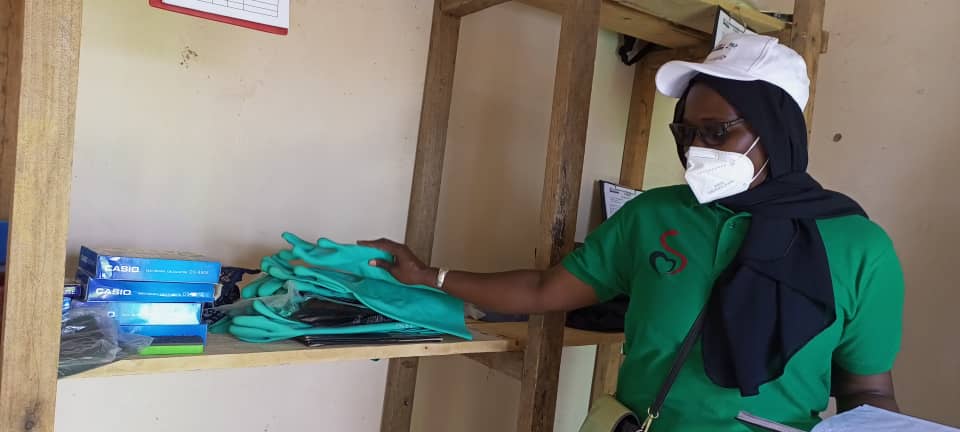Senegal

In 2012, Sokhna Tall joined the U.S. President Malaria Initiative (PMI) Africa Indoor Residual Spraying Project in Senegal. While working as an Assistant Accountant, she became interested in indoor residual spraying (IRS) technical work and began participating in various project training courses for IRS operations, including training of trainers, spray operators, team leaders, pump technicians, washers, and guards. In 2014, she was promoted to District Coordinator and has continued in that role with the PMI VectorLink Project. As a District Coordinator, Sokhna ensures the coordination of all IRS activities in Koungheul District, including logistics management, advocacy with the authorities, training of seasonal workers, monitoring of environment compliance and supervision of IRS operations. When not planning or carrying out IRS, she oversees supply logistics and distribution of insecticide-treated nets (ITNs) with the project. Recently, Sokhna took time to talk about her role in fighting malaria.
Do you have any personal experience with malaria?
Growing up in Dakar, Senegal, I had multiple experiences with malaria. The experience that really affected me was in August 2009 during the peak of malaria transmission in Senegal. My son, who was just one and a half years old at the time, fell sick with malaria. When I took him to the hospital, I was shocked by the high number of children suffering from malaria, some of them under IV treatment for severe malaria. The number of beds available was not sufficient for all the children. Some mothers were just seated on the floor with their children. This experience contributed to my decision to apply and work for a malaria prevention project as I was convinced that malaria was a real burden for mothers like me. Today, more than 10 years later, situations like this are no longer observed in Dakar and in many regions in Senegal as the incidence of malaria has decreased significantly due to the extensive use of ITNs and IRS in some districts.
Can you talk about how the project has worked to provide malaria services during the COVID-19 pandemic?
At the beginning of the pandemic, the project developed a contingency plan for IRS in the COVID context. This contingency plan follows Ministry of Health and PMI guidelines, which includes ensuring barrier and prevention methods for spread of the disease in all IRS activities. The project also includes COVID prevention measures in IRS workshops and trainings to ensure all participants are compliant with the guidelines. The project successfully carried out the IRS campaigns in 2020 and 2021, protecting approximately 571,600 people each year from malaria.
What impact has your job had on malaria in Senegal?
I can proudly say that the PMI VectorLink Project is contributing to the decreased density of malaria vectors in all sprayed areas of the district. Malaria incidence has reduced from 8.1 to 7.7 per 1000 from 2019 to 2020 in the Kaffrine Region, which includes Koungheul District where I supervise IRS. We have received lots of gratitude from communities who have let us know that they are sleeping quietly with no mosquito noise around. Medical professionals from the district have also reported a decrease of malaria cases in children specifically.
What changes have you seen in IRS implementation since the project began?
Many changes have been introduced since the beginning of the project but the most ones are related to the introduction and use of new information technologies, such as the use of smartphones for data collection and the introduction of mobile payments for seasonal workers. Previously, we used a paper-based data collection system, which was a source of constant headache, long working hours, and multiple discussions within the district team. Under the PMI VectorLink Project, data collection in Senegal is done through a smartphone and is a real relief for my work as a District Coordinator.
How does the project invest in local partners to lead malaria programs?
The project builds the skills of national partners like the National Malaria Control Program (NMCP), regional medical teams, district health teams, National Service of Hygiene, and environment officers to carry out IRS. For example, in 2021, the project conducted a Master Training workshop which trained national partners in the process of IRS planning, implementation, monitoring and all aspects of a campaign at the national and local levels. In addition, every year the project trains local leaders in IRS, from training of trainers to insecticide management, procurement, and so on. Local partners are the key to the success of the activities, and the partners are involved in all IRS implementation steps. All activities are conducted in collaboration with the local partners to ensure malaria prevention services can be sustained.
Community health workers are an important link because all activities are carried out at the community level. They know the field better, and are often the messengers, supervisors, and sometimes operators in IRS activities. Community health workers are strongly encouraged to apply to all positions of IRS activities. Once they are recruited, the project trains them and hires those who meet the criteria to be involved in IRS.
How does VL tailor its approach to ensure it fits Senegal’s needs?
PMI VectorLink adapts to the realities of the country, taking into consideration the concerns of the country’s health systems. The project’s work is aligned to the National Malaria Strategic Plan developed by NMCP. All activities (planning, operational activities, etc.) are discussed and done in concert with national and local partners.
The NMCP and the Vector Control Steering Committee choose which districts receive IRS services. These districts are in rural areas where access to care is not always easy. The project provides protection for everyone in these districts, particularly those most vulnerable to the malaria.


